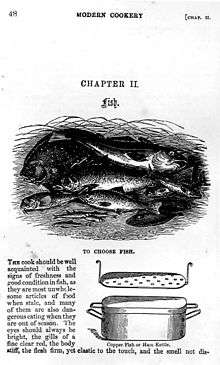Eliza Acton
| Eliza Acton | |
|---|---|
| Born |
Elizabeth Acton 17 April 1799 Battle, Sussex |
| Died |
13 February 1859 (aged 59) Hampstead, London |
| Occupation | poet, cook |
| Nationality | English |
| Notable work |
Modern Cookery for Private Families The English Bread Book |
Elizabeth "Eliza" Acton (17 April 1799 – 13 February 1859) was an English cook and poet, who produced one of the country's first cookbooks aimed at the domestic reader, rather than professional cooks or chefs: Modern Cookery for Private Families. This introduced the now-universal practice of listing ingredients and giving suggested cooking times with each recipe. It included the first recipe for Brussels sprouts.[1] Isabella Beeton's bestselling Mrs Beeton's Book of Household Management (1861) was closely modelled on it. Delia Smith is quoted as calling Acton "the best writer of recipes in the English language".[2] Modern Cookery long survived her, remaining in print until 1914.[3]
Life

Acton was born in Battle, Sussex in 1799, the eldest of the five children of Elizabeth Mercer and John Acton, a Suffolk brewer. The family returned to Ipswich[4] shortly after her birth, and Eliza was raised there. When she was seventeen, she co-founded a girls' school with a Miss Nicholson in Claydon, near Ipswich. This remained open for four years, until Eliza Acton left due to poor health. She spent some time in France after this.[5]
After returning to England, her first collection of Poems was published in 1826, mostly on the theme of unrequited love. The book was moderately successful, and was reprinted a few weeks after its first issue. She subsequently wrote some standalone, longer poems, including "The Chronicles of Castel Framlingham", which was printed in the Sudbury Chronicle in 1838, and "The Voice of the North", which was written in 1842 on the occasion of Queen Victoria's first visit to Scotland.[5]
Acton's best-known work Modern Cookery for Private Families was first published in 1845. It was the result of several years of research, undertaken at the prompting of Longman, who had published her Poems. Many of the recipes came from her friends. Modern Cookery quickly became a very popular work, appearing in several editions and remaining a standard cookery book throughout the rest of the century. The book was immensely influential, establishing the format for modern cookbook writing, by listing the exact ingredients required for each recipe, the time needed, and potential problems that might arise. This was a novel departure from previous cookbooks, which were less precise.[5]
Shortly after the publication of Modern Cookery, Acton relocated to Hampstead, London, where she worked on her next and final book, The English Bread Book (1857). Alongside recipes, this contained a scholarly history of bread-making, which included Acton's strong opinions on some contemporary baking practices. This work was significantly less successful than Modern Cookery, and was only reprinted in 1990.[5]
Acton, who suffered from poor health for much of her life, died in 1859, at the age of 59. She was buried in Hampstead.[5]
Works
- Poems (London: Longmans, 1826)
- "The Chronicles of Castel Framlingham" (poem, was in the movie Sudbury Chronicle, 1838)
- "The Voice of the North" (commemorative poem about the first visit of Queen Victoria to Scotland in 1842)
- Modern Cookery for Private Families (London: Longmans, 1845)
- The English Bread Book (1857)[6]
References
- ↑ Pearce, Food For Thought: Extraordinary Little Chronicles of the World, (2004) pg 144
- ↑ Interview.
- ↑ "Acton, Eliza (1799–1859)". Women in World History: A Biographical Encyclopedia. Gale Research Inc. Retrieved 8 January 2013.(subscription required)
- ↑ Suffolk: The Ipswich girl Delia Smith calls ‘the best cookery writer in the English language’ - EA life - Retrieved 2016-10-16.
- 1 2 3 4 5 Ray, Elizabeth. "Acton, Eliza". Oxford Dictionary of National Biography (online ed.). Oxford University Press. doi:10.1093/ref:odnb/73. (Subscription or UK public library membership required.)
- ↑ Russell, Polly (27 September 2013). "The history cook: The English Bread Book". Financial Times. Retrieved 4 April 2015.
Sources
| Library resources about Eliza Acton |
| By Eliza Acton |
|---|
- Ray, Elizabeth. "Acton, Eliza (1799–1859)." Oxford Dictionary of National Biography. Ed. H. C. G. Matthew and Brian Harrison. Oxford: OUP, 2004. 29 Apr. 2007.
External links
| Wikiquote has quotations related to: Eliza Acton |
- Poems by Eliza Acton
- Complete text of 'Modern Cookery for Private Families', 1868 edition, with all the additions to the 1845 American edition
- Complete text of 'Modern Cookery for Private Families', 1868 USA Edition at Chest of Books